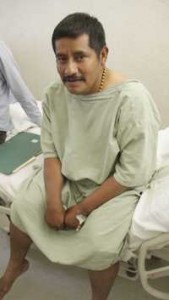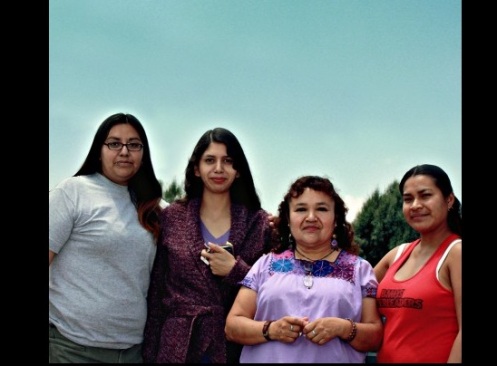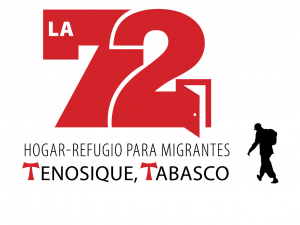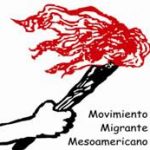The Alberto Patishtán Case
____________________________
The Simojovel Massacre
Chronicle of an (almost) forgotten police massacre

** Seven uniformed (police) were ambushed and killed on June 12, 2000
** The EPR, paramilitaries and Zapatistas were accused
** A week later, Alberto Patishtán, a teacher, was detained
** The PGJE also blamed an indigenous man, Salvador López
By: Hermann Bellinghausen
San Cristóbal de las Casas, Chiapas, March 22, 2013
The notoriety gained by Alberto Patishtán Gómez’ struggle to attain his freedom has prevented the crime that led to his personal misfortune of spending 12 years in prison (and with 48 more still to serve, according to his sentence) from being forgotten, which is certainly contrary to the wishes of many authorities, at least the state ones, from 2000 to the present, including four governors, literally from every party. What happened on the morning of June 12, 2000 in Las Lagunas de Las Limas, Simojovel? What could be the motive of the perpetrators? What was going on there in those days?
The murder of seven police –the state commander Francisco Pérez Morales, five officers under his command, and the El Bosque municipal commander, Alejandro Pérez Cruz – represented an act of enormous gravity. Today perhaps we have become accustomed to that level of news, but back then, even for the militarized and para-militarized Chiapas, it was extraordinary. It of course occupied all the newspaper headlines the next day.
Three weeks later, the elections would be held in which the PRI would lose the Presidency, and in August the governorship. President Ernesto Zedillo, historically and personally involved with the development of the war against the indigenous of Chiapas, in general, and of those from El Bosque, in particular, was ready to visit the state on Tuesday, the 13th, to inaugurate a highway in the Lacandón Jungle, but suspended his tour. The PRI candidate for governor, Sami David, did the same. The federal Army sent hundreds of soldiers, occupied the place of the ambush, the municipal headquarters, the roads, and immediately entered the Zapatista communities. Nevertheless, the first hypothesis of the Secretary of National Defence was that it could be dealing with “a cell of the Revolutionary Popular Army (EPR, its initials in Spanish)” (La Jornada 13/06/2000), something that surprised people because not then, nor ever, did it have a presence in the zone.
That same day, the hypothesis of the Independent Centre of Farmworkers and Campesinos (CIOAC) seemed more credible, due to their historic presence in the region: they could be “paramilitaries from the Mira” (although with hindsight, the paramilitary group in El Bosque, terrifying and lethal, was known as Los Plátanos from the name of the community where they had settled, together with judicial police: it was from here that they went out on June 10, 1998, to participate in the massacre of Zapatistas in Unión Progreso. This reporter was present in Los Plátanos, months before the ambush, at a “burning for the media” of marijuana plants with the aim, which failed in the end, of blaming the EZLN).
The federal police initially talked about drug traffickers. The movement of marijuana coming from Huitiupán was no secret.
The massacre was on a Monday. The previous Saturday the Zapatistas had commemorated the second anniversary of what happened in Unión Progreso and Chavajeval and the incarceration of the autonomous authorities of San Juan de la Libertad. Diego Cadenas, then a young lawyer with Frayba, stated to La Jornada on the day of the ambush that that on June 10, when he was traveling to Unión Progreso to participate in the religious acts for the second anniversary of the 1998 massacre, at the military checkpoints at Puerto Caté and San Andrés Larráinzar the soldiers told him that: “individual rights were suspended.” This was not the case.
Two days later, a commando force of between 10 and 15 individuals, with barricades constructed and high-powered weapons, efficiently ambushed the dark green pick up coming from Simojovel, in which eight police were traveling with the official driver of the municipality of El Bosque, the younger son of the Mayor Manuel Gómez Ruiz. Gravely injured, the young Rosemberg Gómez Pérez, who was driving the vehicle with the two commanders in the cabin, and Belisario Gómez Pérez, the Public Security agent who was in the back with his compañeros from the (police) corporation, were left for dead by the attackers, and by surviving became the only eyewitnesses.
La Jornada also reported that this was “the eighth ambush” so far in the year 2000. The attacks had already left 20 dead and an equal number injured. The policemen killed in Las Lagunas were Francisco Escobar Sánchez, Rodolfo Gómez Domínguez, Guadalupe Margarito Rodríguez Félix, Arbey Vázquez Gómez and Francisco Pérez Mendoza. Two of them are still remembered today by cement crosses at the bend where they were riddled with bullets. 85 bullets from AK-47 and R-15 rifles were counted.
The EZLN distances itself and investigates
The day following the ambush, the Clandestine Indigenous Revolutionary Committee, General Command of the EZLN declared in a brief communiqué: “According to information, the attack was carried out using the tactics of drug traffickers, paramilitaries or the military. The use of the so-called ‘coup de grâce’ is recurrent in these armed groups. The attack took place in an area saturated with government troops (Army and police), where it would have been very difficult to mobilize an armed group without being detected and without the complicity of the authorities. The attacking group had inside information about movements and the number of people ambushed. This information could only be obtained by people from the government or close to it.”
The rebel commanders pointed out: “The EZLN is investigating to clarify the identity and motive of the attacking group. Everything points to those who carried out the attack being from the government (or under governmental auspices), since this would give them a pretext for increasing the militarization of Chiapas, and for justifying an attack on Zapatista communities or the EZLN. It is noteworthy that this act reinforces the climate of instability, with which the official candidate threatens [the state] if he doesn’t win.
“Open provocation or not, the violent act is already an argument for increasing military presence throughout the state, even in zones very far away from the scene of the crime,” the communiqué adds (13/6/2000), detailing that: “in the last three hours, the federal barracks at Guadalupe Tepeyac, in Las Margaritas; Cuxuljá, in Ocosingo; Caté, in El Bosque, and the municipal headquarters of Simojovel and El Bosque have been reinforced even more. Similarly, the number of armed aircraft and flyovers has increased in the Highlands (Altos), Jungle (selva) and Northern Zones.” And finally, “the EZLN disclaims itself from [responsibility for] this act and calls on public opinion not to permit deceit.”
Patishtán’s capture
Nevertheless, the state government of Roberto Albores Guillén, through their prosecutor, Eduardo Montoya Liévano, immediately fostered the hypothesis that the attackers could be Zapatistas, in alleged revenge for the massacre against them ordered by the very same Albores Guillén two years before, although he also recognized that they could be “robbers.” The convoy attacked, he said, was patrolling to “combat gangsters.”
Senator Carlos Payán Velver, a member of the Cocopa, proposed that the legislative commission travel to the state, because the situation was “grave and critical.” Deputy Gilberto López y Rivas, also a member of the Cocopa, pointed out that it had the appearance of “a provocation from the paramilitaries who were set up by the state government itself” (La Jornada 14/6/2000).
On the same date, Víctor Manuel Pérez López, leader of the CIOAC, revealed that in 1997 the Chiapas government armed and financed “dissidents of the Labour Party (Partido del Trabajo)” to fight the short-lived municipal government of this [Labour] party and the CIOAC. “Everyone in the zone knows who they are,” he said, and: “once the objective” of returning the municipal presidency to the PRI had been fulfilled, they “dedicated themselves to robbery and drug trafficking.” They act, he added, “with complete impunity, in broad daylight, even when the military and police undertake frequent patrols.”
By then, in two previous ambushes, four people had been murdered; according to the CIOAC, they were “Zapatista bases.” On January 13, on the road to Chavajeval, heavily armed masked men murdered Martín Sánchez Hernández, and later, on February 1, Rodolfo Gómez Ruiz, Lorenzo Pérez Hernández and Martín Gómez, all of them Tzotziles.
Deputies of the PRD and PAN accused the secretary of Government, Mario Lescieur Talavera, of negligence, and said that the ambush would be used as a pretext for the arrival of more members of the Federal Preventive Police. The tanks, helicopters and the federal Army’s artillery had already arrived.
The episode was ditched; damage control was urged. The government wanted to attain it, so that President Zedillo could travel to Marqués de Comillas on June 19 to inaugurate his highway. That same day, in the El Bosque municipal headquarters, the Army and the PFP captured the teacher Alberto Patishtán Gómez, without showing an arrest warrant. A group of residents, identified as PRI members, “visibly emotional” (La Jornada, 20/6/2000), requested the state Congress’ intervention, maintaining that the detainee was innocent, “they distanced themselves from the violent acts of June 12” and argued that they were not armed nor did they belong to any paramilitary group. No attention was paid to them, instead they were threatened.
Patishtán was kept for one month illegally “under house arrest” in the Safari Hotel in Tuxtla Gutiérrez. His family, friends and co-religionists occupied the town hall and demanded the teacher’s release. Not even their own party backed them up. And not only that, the then PRI deputy Ramiro Miceli Maza, friend of the mayor (municipal president), and godfather of the young Rosemberg, turned out to be key in intimidating and accusing the teacher and community leader, who ended up imprisoned in Cerro Hueco Prison.
Also on June 19, when giving his opinion on the imminent elections of July 3, 2000, Subcomandante Marcos wrote: “Meanwhile, we are trembling here. And it’s not because ‘Croquetas’ Albores has contracted Alazraki so that ‘he lifts up’ his image (probably Albores already looks for money in the promotion of dog food), not for the six hundred thousand dollars that are going to be paid him (with money originally allocated to ‘solve the conditions of poverty and marginalization of indigenous Chiapanecos,’ Zedillo dixit). Neither is it because of the barks from the ‘puppy’ Montoya Liévano (now he is more nervous because it is being discovered that his ‘boys’ –in other words, his paramilitaries– were the ones responsible for the attack on the Public Security (police) in El Bosque, last June 12). No, we are trembling because we are soaked with rain. And it’s the case that, between helicopters and storms, we can’t find a good roof.”
Now against the Zapatistas
The following July 10, after the federal elections, one month after the ambush, state police detained two EZLN support base residents of Unión Progreso in Bochil, accusing them of participating in the crime. They did this even though the Attorney General of the Republic maintained that the attackers had been a group of PRI dissidents, among them Patishtán. These accusations crossed with Mayor Manuel Gómez Pérez, who they had been attacking for months because of his scandalous corruption.
The State’s Attorney General of Justice (PGJE, its initials in Spanish) had his own lines of investigation. “Resorting to the police posted in Los Plátanos, who know about this, the authorities planted weak evidence of a crime on two indigenous men from Unión Progreso” (La Jornada, 15/7/2000). One of them, Salvador López González, was tortured and interrogated without a translator, he signed an ad hoc confession and was incarcerated. In prison he met his co-accused: Patishtán. Without even knowing each other, both were charged with all the weight of the ambush.
La Jornada reported from Unión Progreso: “The police detachment that detained the Zapatistas has had the marijuana plants in Los Plátanos in sight for a long time. The internal violence in that population centre, controlled by a known paramilitary group, has always served as a pretext for accusing and attacking the neighbouring Zapatistas. According to the representative from Unión Progreso, ‘they accuse us of what they themselves do.’ The federal Army has entered Los Plátanos to destroy these crops, the only ones detected in the area, on at least on two occasions, although without detainees.”
Salvador and his brother Manuel “were seized” on July 10. Their families stated: “The Public Security (SP, its initials in Spanish) police beat them, took off their shoes and clothes, and left Salvador unconscious.” With the detainees were a little boy (“who cried a lot”) and a teenager, who “came to advise that they had taken the compañeros away.”
As the captors were not from Bochil, but rather from El Bosque, “they rented a jail for a while.” The detainees were quickly sent to Cerro Hueco (state prison). “Those from the SP put a handful of marijuana and a handful of bullets” on them and they stole 28 boxes of soft drinks from them. Manuel would soon be released.
Exactly one month before, on June 10, hours before the police killings, the SP quartered in Los Plátanos intercepted a truck from Unión Progreso. The driver was the same Salvador. “They interrogated him about a list of names. Since then they wanted to blame the compañeros,” a representative of his community declared: “We don’t know how many are on the list. At best, we are all accused.” (Curiously, Patishtán’s fellow believers had expressed their respective fear with almost the same words when he was detained).
With two scapegoats as dissimilar as Alberto and Salvador, the case started to be “resolved,” or at least forgotten by the national media.
Originally Published in Spanish by La Jornada
Saturday, March 23, 2013
En español: http://www.jornada.unam.mx/2013/03/23/politica/002n1pol









